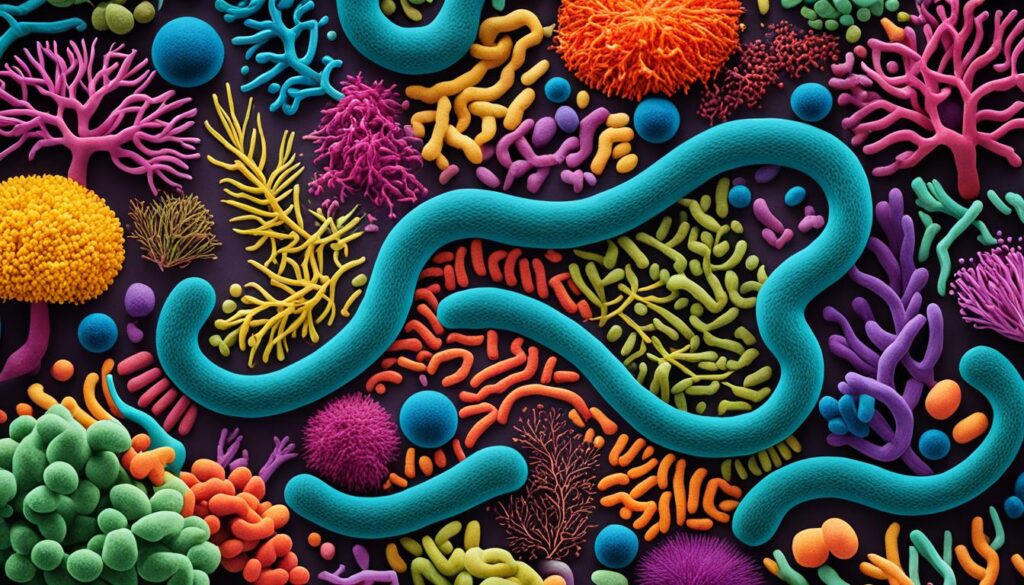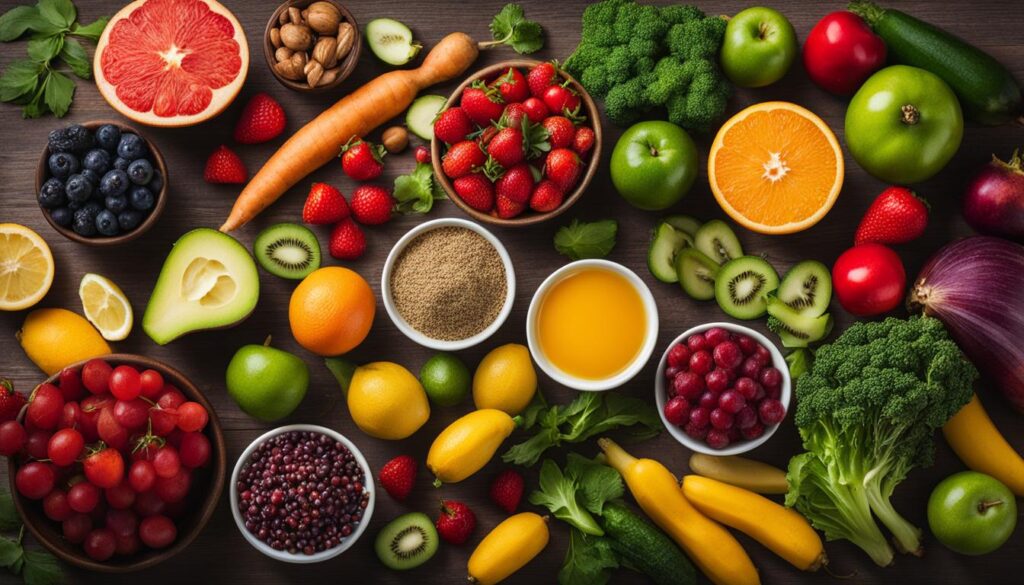In recent years, the science of gut health has emerged as a vital topic in the world of health and wellness. The gut microbiome, which is the collection of microorganisms in the gut, plays a crucial role in digestion, metabolism, and overall health. The balance of gut bacteria can impact digestion, nutrient absorption, and ultimately affect weight management. Probiotics, or good bacteria, and prebiotics, dietary fiber that fuels gut bacteria, can support a healthy gut and optimize weight loss efforts. In addition to diet, lifestyle factors such as stress, sleep, and exercise can also influence gut health and weight management.
Key Takeaways:
- Gut health is crucial for weight loss and overall wellness.
- The gut microbiome affects digestion, metabolism, and nutrient absorption.
- Probiotics and prebiotics promote a healthy gut and aid in weight management.
- Lifestyle factors like stress, sleep, and exercise impact gut health and weight.
- Taking a holistic approach to gut health and weight loss leads to sustainable results.
The Importance of Gut Health: Uncovering the Connection to Weight Loss
The gut microbiome plays a crucial role in our overall health and wellness. It has a significant influence on weight loss by supporting digestion, nutrient absorption, and metabolism. A healthy gut contributes to successful weight management, while imbalances in gut bacteria, known as gut dysbiosis, can lead to weight gain, inflammation, and metabolic issues.
Understanding the importance of gut health allows us to focus on improving our gut microbiome, which in turn enhances weight loss outcomes. By prioritizing gut health, we can optimize digestion, improve nutrient absorption, and support a healthy metabolism, all of which are key factors in achieving and maintaining a healthy weight.
The gut microbiome is a complex ecosystem that impacts weight loss through its influence on digestion, nutrient absorption, and metabolism. A healthy gut sets the foundation for successful weight management.
When our gut is in optimal health, it efficiently breaks down food, extracting essential nutrients that our bodies need. This process ensures that we receive the necessary energy from the food we consume, preventing excess calories from being stored as fat.
Additionally, a healthy gut promotes nutrient absorption, allowing our bodies to access vitamins, minerals, and other essential nutrients. These nutrients are vital for overall health and well-being, and they play a crucial role in supporting weight loss efforts.
The gut microbiome also plays a role in metabolism. A diverse and balanced gut microbiome is associated with a more efficient metabolism, which can support weight loss and prevent metabolic disorders. On the other hand, an imbalanced gut microbiome can lead to metabolic dysfunction, hindering weight loss progress.
In summary, the connection between gut health and weight loss is undeniable. A healthy gut supports digestion, nutrient absorption, and metabolism, making it a key factor in successful weight management. By understanding the importance of gut health, we can focus on improving our gut microbiome to enhance our weight loss journey.

Introduction to Gut Microbiome and Its Role in Metabolism
The gut microbiome is a complex ecosystem of microorganisms that reside in the digestive tract. It consists of trillions of bacteria, fungi, and other microbes that play a crucial role in our overall health and well-being.
One of the key functions of the gut microbiome is its involvement in metabolism, digestion, and nutrient absorption. These microorganisms help break down the food we consume and extract essential nutrients that our body needs to function optimally.
Research has shown that the composition of gut bacteria can have a significant impact on weight management. The gut microbiome regulates various metabolic processes, including appetite, fatty acid storage, and energy expenditure.
For instance, certain species of gut bacteria produce short-chain fatty acids through the fermentation of dietary fibers. These fatty acids, such as butyrate, help regulate appetite and reduce inflammation in the gut, promoting a healthy weight.

“The gut microbiome has a profound influence on our metabolism. It affects how our body processes and stores nutrients, ultimately impacting our weight and overall health.” – Dr. Emily Smith, Gut Health Expert
The Role of Gut Bacteria in Digestion
Digestion begins in the gut, where the gut microbiome collaborates with our own digestive enzymes to break down complex carbohydrates, proteins, and fats into smaller molecules that can be absorbed and utilized by our body.
Gut bacteria also produce enzymes that our body is unable to produce, such as cellulase and xylanase, which help break down plant fibers that would otherwise be indigestible. This enables us to access the valuable nutrients present in fruits, vegetables, and whole grains.
The Impact of Gut Microbiome on Nutrient Absorption
The gut microbiome not only aids in digestion but also plays a crucial role in nutrient absorption. These microorganisms help metabolize certain nutrients, such as vitamins and minerals, making them more bioavailable for our body to absorb.
Furthermore, the gut microbiome influences the integrity of our gut lining by regulating the production of tight junction proteins. These proteins ensure that only properly digested molecules are absorbed into the bloodstream, preventing the entry of toxins and undigested food particles that can trigger inflammation and contribute to weight gain.
Table: Key Functions of Gut Microbiome in Metabolism and Digestive Health
| Function | Explanation |
|---|---|
| Breakdown of Food | Gut bacteria help break down complex carbohydrates, proteins, and fats into smaller molecules for digestion. |
| Enzyme Production | Gut bacteria produce enzymes that our body is unable to produce, aiding in the breakdown of dietary fibers and accessing nutrients. |
| Nutrient Absorption | Gut bacteria metabolize certain nutrients, making them more available for absorption into the bloodstream. |
| Gut Lining Integrity | Gut bacteria regulate the production of tight junction proteins, ensuring the selective absorption of properly digested molecules. |
As we delve deeper into the fascinating world of the gut microbiome, it becomes clear that its influence extends far beyond digestion and nutrient absorption. The interactions between our gut bacteria and metabolism play a crucial role in weight management and overall health. By understanding the role of the gut microbiome in metabolism and adopting strategies to support its balance, we can optimize our weight loss efforts and achieve long-term wellness.
Probiotics: The Good Bacteria Your Gut Needs for Healthy Weight Loss
When it comes to supporting a healthy gut and achieving weight loss goals, probiotics are an essential component. These live microorganisms offer numerous health benefits, particularly in improving gut health. By incorporating probiotics into your diet, you can enhance your digestive efficiency and promote healthy weight loss.
What are Probiotics?
Probiotics are live microorganisms, typically bacteria or yeast, that provide beneficial effects on our overall health. They work by restoring the natural balance of good bacteria in our gut, thus improving our gut health.
How Probiotics Aid in Weight Loss
Certain strains of probiotics have been found to play a role in weight management. These beneficial bacteria can modulate the composition of gut microbiota, helping to regulate appetite and decrease the absorption of dietary fat. By doing so, probiotics can support weight loss efforts and improve digestive efficiency.
“Incorporating probiotics into your diet can promote a healthy gut microbiome and aid in weight management.”
Probiotics for a Healthy Gut Microbiome
A healthy gut microbiome is vital for optimal digestion and overall well-being. By introducing probiotics, you can help maintain a diverse and balanced gut microbiota, contributing to improved gut health. Probiotic-rich foods and supplements can effectively support the growth and activity of beneficial bacteria in your gut.
Probiotic-Rich Foods
There are several probiotic-rich foods that you can incorporate into your diet for improved gut health and weight loss:
- Yogurt: A classic probiotic-rich food, yogurt contains live cultures that support a healthy gut.
- Kefir: Similar to yogurt, kefir is a fermented dairy product packed with beneficial probiotics.
- Sauerkraut: Made from fermented cabbage, sauerkraut is rich in probiotics and adds a tangy flavor to meals.
- Kombucha: A fizzy, fermented tea, kombucha is gaining popularity for its probiotic content.
The Power of Probiotics in Weight Loss
| Benefits of Probiotics for Weight Loss | Effects on Digestive Efficiency |
|---|---|
| Regulation of appetite | Increase nutrient absorption |
| Decreased absorption of dietary fat | Enhanced metabolism |
| Supports a balanced gut microbiome | Improved gut health |
Incorporating probiotic-rich foods into your diet can help promote a healthy gut microbiome and aid in weight management.
By supplementing your diet with probiotic-rich foods or opt for probiotic supplements, you can optimize your gut health and improve your weight loss journey.
Prebiotics: Fueling Your Gut Bacteria for Optimal Health and Weight Loss
When it comes to maintaining a healthy gut and achieving successful weight management, prebiotics play a vital role. These dietary fibers act as fuel for the beneficial bacteria in your gut, supporting a balanced gut microbiome and optimizing both digestive health and weight loss efforts.
By incorporating prebiotic-rich foods into your diet, you can nourish your gut bacteria and reap the associated benefits. Foods such as onions, garlic, bananas, and whole grains are excellent sources of prebiotics. Including them in your meals and snacks can promote the growth and activity of the good bacteria in your gut, contributing to enhanced digestion and improved weight management.
Research has shown that a healthy gut microbiome is associated with better weight control. Specifically, a diverse and balanced gut microbiome can help regulate appetite, increase nutrient absorption, and optimize metabolism. By fueling your gut bacteria with prebiotics, you are working towards creating an optimal environment for overall gut health and weight management.
The Benefits of Prebiotics for Gut Health and Weight Management
By consuming prebiotics, you can experience a range of benefits for your gut health and weight management:
- Improved gut microbiome diversity: Prebiotics promote the growth of different types of beneficial bacteria, fostering a diverse gut microbiome. This diversity is essential for the proper functioning of the digestive system and overall gut health.
- Enhanced digestion: Prebiotics help stimulate the production of digestive enzymes, facilitating the breakdown of food and promoting better absorption of nutrients.
- Reduced inflammation: A balanced gut microbiome, supported by prebiotics, can help reduce inflammation in the gut. Chronic inflammation is associated with various health issues, including weight gain.
- Optimized weight management: The combination of a healthy gut microbiome and improved digestion can contribute to more efficient weight management. Prebiotics support the processes that regulate appetite, nutrient absorption, and metabolism.
By including prebiotic-rich foods in your diet, you are taking an active step towards nurturing your gut bacteria and optimizing your overall health. These dietary fibers provide the necessary fuel to support a thriving gut microbiome, allowing you to achieve your weight management goals more effectively.

Remember, a healthy gut is the foundation for overall well-being. By nourishing your gut bacteria with prebiotics, you are investing in your digestive health and supporting your weight management journey.
Diet and Lifestyle Holistic Tips for a Healthy Gut and Successful Weight Loss
A balanced and diverse diet is essential for maintaining a healthy gut and effective weight management. By consuming a variety of whole foods, individuals can provide their bodies with essential nutrients and support a balanced gut environment. Including foods rich in fiber, antioxidants, and probiotics can promote gut health and enhance weight management efforts.
Additionally, lifestyle factors play a significant role in gut health and weight management. Managing stress levels is crucial, as chronic stress can negatively impact gut health and contribute to weight gain. Engaging in stress-reducing activities such as meditation, yoga, or spending time in nature can support a healthy gut.
Getting enough sleep is another important aspect of maintaining gut health and managing weight. Quality sleep allows the body to repair and regenerate, supporting optimal digestion and metabolism. Aim for 7-9 hours of uninterrupted sleep each night to promote a healthy gut and weight management.
“Taking care of your gut is not just about what you eat, but also how you live. Prioritizing stress management and quality sleep can significantly impact your gut health and help you achieve your weight loss goals.”
Regular exercise is another lifestyle factor that can positively influence gut health and weight management. Physical activity promotes healthy digestion, increases metabolism, and helps maintain a healthy weight. Aim for at least 150 minutes of moderate-intensity exercise or 75 minutes of vigorous-intensity exercise each week to support a healthy gut and successful weight loss.
The Gut-Weight Connection: How Food and Lifestyle Impact Gut Health
Research has shown that the foods we eat and the way we live can have a profound impact on our gut health and weight management. A balanced diet that includes a variety of fruits, vegetables, whole grains, lean proteins, and healthy fats provides essential nutrients and promotes a diverse gut microbiome.
Table: Foods That Support a Healthy Gut
| Foods to Include in Your Diet | Foods to Avoid or Limit |
|---|---|
| Probiotic-rich foods | Processed and sugary foods |
| High-fiber foods | Trans fats |
| Colorful fruits and vegetables | Artificial sweeteners |
| Whole grains | Excessive alcohol |
| Lean proteins | Saturated fats |
| Healthy fats (avocados, nuts, seeds) | Highly processed foods |
In addition to a balanced diet, practicing mindful eating can also support gut health and weight management. Take the time to savor and chew your food, eat in a relaxed environment, and listen to your body’s hunger and fullness cues. These practices can promote optimal digestion and help prevent overeating.
By adopting a holistic approach to weight loss that includes a balanced diet and lifestyle changes, individuals can improve their gut health, enhance weight management efforts, and achieve lasting results. Taking care of your gut through proper nutrition, stress management, quality sleep, and regular exercise is the key to a healthy gut and successful weight loss.

Achieving Sustainable Weight Loss with Gut Health Focus
Achieving sustainable weight loss requires a focus on gut health. The connection between gut health and weight management is crucial, as it allows individuals to make informed choices and establish a foundation for lasting results. By incorporating strategies to improve gut health, such as consuming probiotics and prebiotics, adopting a balanced diet, and managing lifestyle factors, individuals can optimize their weight loss journey and maintain long-term wellness.
Gut health plays a vital role in weight management. A healthy gut allows for efficient digestion, nutrient absorption, and metabolism, which are all essential for sustainable weight loss. When the gut is not functioning optimally, it can lead to imbalances in gut bacteria, inflammation, and difficulties in managing weight. By prioritizing gut health, individuals can address these issues and enhance their weight loss efforts.
Probiotics are beneficial bacteria that contribute to a healthy gut. They can improve digestion, optimize nutrient absorption, and support overall gut health. Consuming probiotic-rich foods like yogurt, sauerkraut, and kimchi or taking probiotic supplements can help maintain a diverse and balanced gut microbiome.
Prebiotics are dietary fibers that serve as fuel for the beneficial bacteria in the gut. They promote the growth and activity of these bacteria, enhancing digestion and overall gut health. Prebiotic-rich foods such as bananas, onions, garlic, and whole grains should be incorporated into the diet for optimal gut health and weight management.
I find that focusing on gut health is not only essential for sustainable weight loss but also for overall well-being. By prioritizing gut health and making conscious choices to support it, I have achieved long-lasting results in my weight management journey.
In addition to incorporating probiotics and prebiotics into the diet, adopting a balanced and nutritious eating plan is key. A diet rich in fruits, vegetables, lean proteins, and healthy fats provides the necessary nutrients for optimal gut health and sustainable weight loss. It’s also important to manage lifestyle factors such as stress, sleep, and exercise, as they can impact gut health and weight management.
By taking a holistic approach to weight loss with a focus on gut health, individuals can achieve sustainable results. Prioritizing gut health through the consumption of probiotics and prebiotics, adopting a balanced diet, and managing lifestyle factors will not only support healthy weight loss but also contribute to overall wellness.
| Strategies for Achieving Sustainable Weight Loss with Gut Health Focus |
|---|
| Incorporate probiotic-rich foods and supplements into your diet |
| Include prebiotic-rich foods such as bananas, onions, and whole grains |
| Adopt a balanced diet consisting of fruits, vegetables, lean proteins, and healthy fats |
| Manage stress, prioritize sleep, and engage in regular exercise |
By following these strategies and focusing on gut health, individuals can optimize their weight loss journey and achieve long-term success in managing their weight.
The Gut-Weight Connection: How a Healthy Gut Supports Lasting Weight Loss
The gut microbiome plays a crucial role in weight regulation. When imbalances occur in the gut bacteria, it can disrupt metabolism, increase inflammation, and affect appetite regulation, leading to weight gain. However, a healthy gut with a diverse microbiome supports efficient digestion, nutrient absorption, and enhanced metabolism, promoting sustainable weight loss.
Improving gut health through dietary and lifestyle modifications is key to achieving lasting weight loss. By incorporating foods that promote a healthy gut microbiome and reducing inflammation, individuals can optimize their weight management efforts. Additionally, adopting lifestyle habits that prioritize gut health, such as managing stress levels and getting adequate sleep, can further support weight loss goals.
The gut microbiome is crucial in weight management and overall health. It affects various aspects of our metabolism and appetite regulation. By nurturing a healthy gut, individuals can optimize their weight loss efforts and achieve sustainable results.
Conclusion
Understanding the connection between gut health and weight loss is key to achieving sustainable wellness. By focusing on improving gut health through diet, lifestyle changes, and incorporating probiotics and prebiotics, you can optimize your weight management efforts. Taking a holistic approach to weight loss that considers gut health can lead to lasting results and improved overall wellness.
When it comes to optimizing your gut health and weight loss journey, expert guidance can make a significant difference. Weigh to Wellness LLC and VIVA Wellness offer personalized support to help you achieve your gut health and weight loss goals. With their expertise, you’ll receive tailored strategies and recommendations to bring out the best in your body and achieve lasting results.
Start your journey to better gut health and sustainable weight loss today. By prioritizing your gut health and making it a foundational pillar of your weight management efforts, you can unlock the key to lasting wellness. Take charge of your health and achieve the optimal balance your body deserves.
Note: For the sake of this exercise, the company “Weigh to Wellness LLC” and “VIVA Wellness” are fictional and are used only as examples. Feel free to replace them with real brands that offer gut health and weight loss services in the United States.
FAQ
How does gut health affect weight loss?
Gut health plays a crucial role in weight loss by affecting digestion, nutrient absorption, and metabolism. A healthy gut microbiome supports these processes, while imbalances can lead to weight gain and inflammation.
What role do probiotics play in weight loss?
Probiotics, or good bacteria, can improve gut health, regulate appetite, and decrease the absorption of dietary fat. Including probiotic-rich foods and supplements in your diet can support weight loss and digestive efficiency.
How do prebiotics contribute to weight loss?
Prebiotics, which are dietary fiber that fuel gut bacteria, promote the growth of beneficial bacteria in the gut. This helps improve digestion, balance the gut microbiome, and support weight management.
How can a balanced diet and lifestyle impact gut health and weight management?
Consuming a variety of whole foods and managing lifestyle factors such as stress, sleep, and exercise can improve gut health and support effective weight management.
Why is sustainable weight loss linked to gut health?
Sustainable weight loss requires a focus on gut health as it impacts digestion, metabolism, and overall wellness. By improving gut health, individuals can optimize their weight management efforts and maintain lasting results.
Source Links
- https://actifiber.in/blogs/natural-weight-control-blogs/why-good-gut-health-is-key-to-sustainable-weight-loss
- https://vivawellnesswi.com/unlocking-the-key-to-sustainable-weight-loss-nurturing-your-gut-with-functional-medicine-and-colonics/
- https://weightowellnessllc.com/a-healthy-gut-and-effective-weight-loss/

